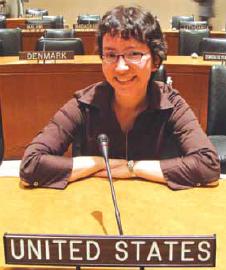 Diocesan youth missioner, Catherine Healy, is one of ten young women delegates selected across nation to participate in UN conference on worldwide status of women
Diocesan youth missioner, Catherine Healy, is one of ten young women delegates selected across nation to participate in UN conference on worldwide status of women
By Catherine Healy,
Diocesan missioner with youth, young adults and higher education
Oregon Episcopal Church News
It was a gray winter morning in Manhattan, and I was standing in line with hundreds of other women outside United Nations Headquarters. As we inched toward the canvas security tent, blowing snowflakes out of our eyelashes and stamping our feet to keep warm, a voice behind me wailed: “I am from HOT country! Bangladesh!” So began the 53rd session of the United Nations Commission on the Status of Women last month. Fortunately, it was all uphill from there.
The Commission on the Status of Women (CSW) was formed in 1946, just a year after the founding of the United Nations itself. Every year since, the CSW has brought together delegates from all over the world to discuss issues of gender equality and advocate for women’s rights In 1979, the commission successfully pushed the UN General Assembly to adopt the Convention on the Elimination of All Forms of Discrimination Against Women (CEDAW), now ratified by all but seven of the UN’s member states.
Participation Diverse Joining the government delegates at the CSW are representatives from hundreds of gender-related nonprofits – the Anglican Communion among them. Over 100 Anglican women attended CSW 2009, including ten young adults (including me) sponsored by the Women’s Ministries Office of the Episcopal Church.
The young-adult delegation was an impressively diverse group, with interests ranging from language policy to public health to redefining gender equality in the church context. Each of us brought a different perspective to the theme of the 2009 session, the theme of which was equal sharing of responsibility between men and women, with a special focus on caregiving for people living with HIV/AIDS. The latter is an issue of enormous concern in many areas of the developing world, where HIV prevalence rates are often more than 20 Percent. When family members grow ill, it is nearly always women and girls who are expected to leave school or drop their other obligations to provide care – even when they are themselves quite sick.
Women shoulder burdens
During the course of our week in New York, our team heard story after story from women whose lives had been turned upside-down by family members’ sudden illnesses. Fulata Mbano-Moyo, a university professor from Malawi (now an executive at the World Council of Churches), explained that she nearly lost her job when she was forced to take a sudden leave of absence to care for her dying husband.
And the support she received from her church? Members of the congregation visited her house every day to ensure that she wasn’t slacking off on the job, forced her to burn her favorite outfit because it was decorated with symbols they feared were “demonic,” and told her that if only she prayed hard enough, her husband would be healed. “I was glad that I had no daughters,” said Mbano-Moyo. “Daughters would have had to drop out of school to cook and clean for the visitors. My sons were never expected to do that.”
One Man Can Campaign
This emphasis on balancing the scales between men and women continued into the realm of men’s roles in achieving gender equality. Several CSW delegates represented South Africa’s Sonke Gender Justice Network, a men’s organization with the slogan “Men of quality aren’t afraid of equality.” Sonke promotes responsible fatherhood, aims to end violence against women and reduce the impact of AIDS, and sponsors the One Man Can campaign, now in its third year. The campaign provides men and boys with specific steps they can take to address offensive language and behavior towards women.
Problems are same
The week was also filled with poignant reminders that when it comes to women’s rights, the “developed” world has a bit more developing to do. During a session I attended on domestic-violence prevention, participants discussed some of the obstacles faced by battered women in rural areas: Economic dependence on their abusers, lack of access to shelters, churches’ frequent complicity in spousal abuse, and on and on. I began to say, “Those are exactly the problems we have in Oregon,” but the woman beside me spoke first: “Those are exactly the problems we have in Nepal.” And those seven countries that have yet to ratify CEDAW? They include Iran, Sudan, Somalia … and the United States.
But overall, the spirit at CSW was one of camaraderie, and the predominant attitude was hope – for both genders’ equal access to positions of leadership, in both religious and secular life; for an end to violence against women everywhere, in places as diverse as rural Oregon and rural Nepal; and for truly equal sharing of rights and responsibilities in families, communities, and the world.
My cold, rainy week in New York made me believe that all these things are possible. Do you?
— Read full newsletter here
— Learn more about the Oregon Episcopal Church
Disclaimer: Articles featured on Oregon Report are the creation, responsibility and opinion of the authoring individual or organization which is featured at the top of every article.

